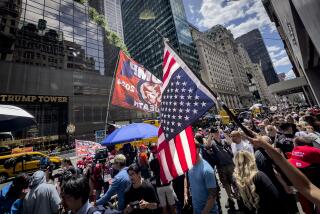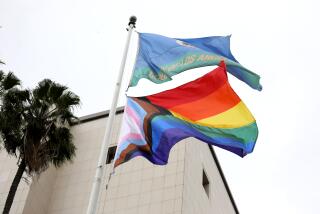House Backs Amendment to Outlaw Flag Desecration
- Share via
WASHINGTON — The House of Representatives on Tuesday approved a constitutional amendment that would enable Congress to outlaw desecration of the American flag.
For the fifth time in eight years, the House voted in favor of a measure that would override a 1989 Supreme Court decision declaring flag-burning to be a form of free speech protected by the 1st Amendment. The vote was 300 to 125, 10 more than the two-thirds majority needed. Of the California delegation, 18 Republicans and 10 Democrats voted for the legislation, and 23 Democrats and one Republican opposed it; one other Republican did not vote.
The proposed amendment consists of one line: “The Congress shall have power to prohibit the physical desecration of the flag of the United States.”
The legislation now goes to the Senate, which has not considered the issue since 1995, when a similar proposal failed to pass by four votes. A constitutional amendment must pass both houses of Congress by two-thirds majorities, then be ratified by 38 of the 50 states within seven years. According to the American Civil Liberties Union, every state has passed a resolution supporting a flag-desecration amendment.
During the debate, the bill’s primary sponsor -- Rep. Randy “Duke” Cunningham (R-San Diego) -- questioned the patriotism of those opposing it. “That flag represents freedoms, traditions and liberties,” he said. “During the Civil War, it was a death penalty [offense] to desecrate the flag.”
Rep. Sheila Jackson-Lee (D-Texas) did not hesitate to answer Cunningham’s charges. “Today, we all stand as patriots,” she said. “The Constitution is to give rights. This amendment does nothing to enhance the rights of Americans.”
Midway through the three-hour debate, Rep. Henry J. Hyde (R-Ill.) compared the flag to “a family photo on your desk” and said that the Stars and Stripes symbolizes “the unifying ideals that most Americans hold sacred.”
“Woven into the flag is the collective history of America -- from Bunker Hill to Baghdad,” he said. “Free speech is not absolute. It never has been.”
In 1989, overturning federal and state laws against desecrating the flag, the Supreme Court wrote: “If there is a bedrock principle underlying the First Amendment, it is that the government may not prohibit the expression of an idea simply because society finds the idea itself offensive or disagreeable.”
In response, Congress passed a bill protecting the flag against desecration, but the court ruled in 1990, again by a 5-4 vote, that the law was unconstitutional.
The House approved a flag-desecration amendment in 1995, 1997, 1999 and 2001. In the Senate, legislation did not even get out of committee except in 1995.
House Majority Leader Tom DeLay (R-Texas), asked why the House kept considering the issue even though it has always died in the Senate, said: “We will keep doing it till we actually get it done.”
*
Times staff writer Janet Hook contributed to this report.
More to Read
Get the L.A. Times Politics newsletter
Deeply reported insights into legislation, politics and policy from Sacramento, Washington and beyond. In your inbox three times per week.
You may occasionally receive promotional content from the Los Angeles Times.










